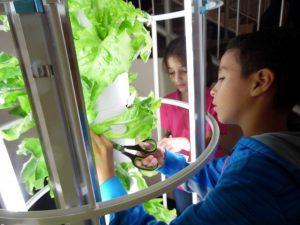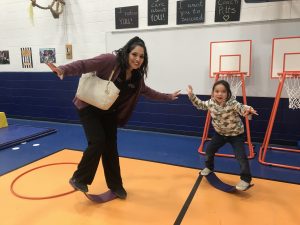Making Health a Priority and Meaning It
Colonial Hills Elementary School
San Antonio, Texas
Colonial Hills Elementary, in San Antonio, TX, set a goal several years ago to ensure that all children have access to a healthy school environment where they can learn and flourish. Progress toward the goal began when PE teacher Terri Pitts first applied for a grant from Action for Healthy Kids to build school gardens. Terri quickly realized there was more to having successful, healthy students than just planting a few beds.
 Once the initial garden beds were in place, Colonial Hills Elementary wanted the produce from the school community garden to go straight to the school cafeteria so all students could try samples. Working with the district’s nutrition department, they made this a reality.
Once the initial garden beds were in place, Colonial Hills Elementary wanted the produce from the school community garden to go straight to the school cafeteria so all students could try samples. Working with the district’s nutrition department, they made this a reality.
The first year with a grant, staff, students, and volunteers planted 12 garden beds, but the shed they had built was vandalized, which was devastating. This made them realize they needed community support and involvement, so they distributed a survey to find out if the school community was interested in improving the school wellness environment. They surveyed parents, teachers, students, and other community partners and received an overwhelmingly positive response.
As the garden continued to grow, the school expanded the now 19-bed community garden in a non-traditional direction. They have added an aeroponic system tower garden, three strawberry tower gardens made of PVC pipes, and two small vertical gardens within the garden. One student’s observation about “urban farming” led to the vertical gardening project, and families have now been able to apply these vertical garden examples and lessons at their own homes. Students at Colonial Hills have been eating a lot more fruits and vegetables as a result of growing their own foods.
 The survey results also helped Colonial Hills organize by establishing two committees. The Wellness/Garden Committee has a representative from every grade level, a nurse, nutrition staff, an administrator, parents, and community partners. They decided they needed students if they really wanted to involve the entire school community, so they also created the Legacy Kids School Health Advisory Council (KSHAC). The KSHAC includes 12 third to fifth graders that meet three to four times a month to develop their own ideas on ways to promote health and wellness actions on campus. These students participate in fitness and health morning announcements, and assist with the annual health fair and family fitness nights.
The survey results also helped Colonial Hills organize by establishing two committees. The Wellness/Garden Committee has a representative from every grade level, a nurse, nutrition staff, an administrator, parents, and community partners. They decided they needed students if they really wanted to involve the entire school community, so they also created the Legacy Kids School Health Advisory Council (KSHAC). The KSHAC includes 12 third to fifth graders that meet three to four times a month to develop their own ideas on ways to promote health and wellness actions on campus. These students participate in fitness and health morning announcements, and assist with the annual health fair and family fitness nights.
Realizing the importance of parent engagement for ensuring what children learn at school is practiced at home, Colonial Hills began sending information home to parents. They also updated their website mission statement to say, “We do not include food items in our fundraisers. We love birthday celebrations; however, no cupcakes, candy or cake for our celebrations. Fruit and party favors like pencils or stickers are a great alternative for celebrating. Colonial Hills does not sell competitive foods or drinks at our school. No foods or beverages are advertised on our campus. We do not serve or offer additional foods or beverages at our school or during the extended school day.”
In addition to the building out the gardens and wellness committees, Colonial Hills has made other positive changes, such as:
- offering PE to every student on campus for 150 minutes a week,
- incorporating recess and brain breaks daily,
- and ensuring all foods served and sold to staff at staff meetings, school-sponsored staff events, and in the staff lounge also meet the Smart Snacks in School nutrition standards.
With all of the healthy improvements the school has made over the past few years thanks to Action for Healthy Kids grant funding, student confidence and self-esteem has increased, the campus has come together, and the community stakeholders are more invested in the school. It has also helped to create lasting habits that will carry students through school and beyond.
This grant was made possible by funding from Saputo.
Categories: Elementary School, Saputo, Nutrition and Physical Activity, School Grants, Texas